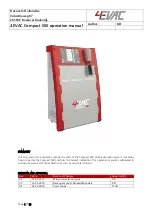
16
012007
Page
CE - Declaration of conformity
2
Warranty
2
Safety instructions
16
Correct use
17
Unpacking
18
Commissioning
18
Connecting the pH-probe
18
Replacing extension cable and temperature sensor
18
Factory setting
19
Configuration
19
- Language
19
- Operating mode
19
- Maximum temperature
20
- Target temperature
20
- Temperature controller
20
- Time out
20
- pH-Measurement
21
- Reset
21
- Exit
21
- pH-Calibration
22
- PT 1000-Calibration
22
Error codes
23
Accessories
24
Technical Data
24
For your protection
• Read the operating instructions in full before starting up and
follow the safety instructions.
•
Keep the operating instructions in a place where they can be
Contents
Safety instructions
accessed by everyone.
•
Ensure that only trained staff work with the appliance.
•
Follow the safety instructions, guidelines, occupational health
and safety and accident prevention regulations.
•
Wear your personal protective equipment in accordance with the
hazard category of the media to be processed.
• Caution!
The supply voltage (Limited Power Supply) for the
ETS-D6
must be provided using an IEC 61558 compliant trans-
former with double or reinforced insulation. Alternatively, labora-
tory equipment that meets the requirements of IEC 61010 or
NEC Class 2 may be used.
• Caution!
This equipment must only be used with media that
have a flash point higher than the temperature safety limit set for
the magnet agitator and/or heating system used.
The safe temperature limit must always be set to at least 25 °C
lower than the fire point of the media used.
• Burn hazard!
Take care when touching the temperature sensor!
The temperature sensor may heat up to 450 °C when inserted in
the media!
•
Do not touch the temperature sensor while measurements are
being taken. This will prevent incorrect results.
•
Ensure that the external temperature sensor (PT 1000, ETS-D ...)
is inserted in the media to a depth of at least 20 mm, see fig. 2.
•
Please ensure that the spiral cable does not come into contact
with the heating plate.
•
The stainless steel temperature sensor must not be used with
aggressive media such as acids, caustic solutions or distilled
water, due to the risk of corrosion. The glass sensor should be
used in such cases.
•
Only use glass encapsulated temperature sensors for electrolysis
procedures.
•
Always use the extension cable H
70
when the media being proces-
sed produces vapour. This ensures that the control unit does not
come into contact with the vapour.
•
Beware of hazards due to:
- flammable materials
- combustible media with a low boiling temperature
EN
















































